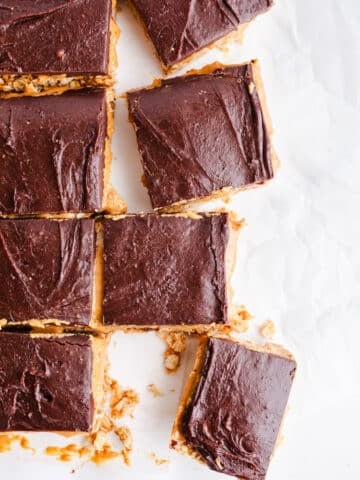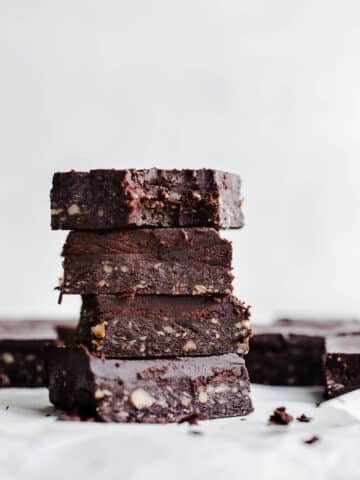Looking for a coconut oil substitute? Explore our guide to find the best coconut oil alternatives such as olive oil, avocado oil, or ghee. Learn how to make substitutions for similar results in a variety of recipes.

Jump to:
What is coconut oil?
Coconut oil is an edible oil extracted from the meat of mature coconuts. It's primarily composed of saturated fats. About 80-90% of its fat content comes from these saturated fatty acids. This makes it solid at room temperature and highly stable for cooking.
There are two main types of coconut oil: virgin coconut oil (unrefined) and refined coconut oil. Unrefined coconut oil is extracted from fresh coconut meat without high heat or chemicals, preserving its coconut flavor and aroma. Refined coconut oil is made from dried coconut meat and is deodorized and bleached to have a more neutral taste and smell.
Coconut oil is popular for cooking, baking, skincare, hair care, and health applications. Its relatively high smoke point (350°F for virgin and 400°F for refined) makes it versatile.
Coconut oil contains medium-chain triglycerides (MCTs) that provide quick energy and may support heart health when consumed in moderation. It also has antimicrobial properties and is beneficial for skin, hair, and oral health when used topically.
Uses
Here are its most common uses:
Sautéing and Frying -Thanks to its high smoke point (especially refined coconut oil), it's ideal for medium to high-heat cooking like with this ground chicken str fry with noodles.
Baking - Often used as a butter substitute in gluten-free and dairy-free recipes. It adds moisture and richness like in these coconut flour brownies.
Makeup Remover - Effectively removes makeup and moisturizes skin simultaneously.
Lip Balm - Keeps lips soft and hydrated.
Conditioner - Deeply moisturizes hair, prevents breakage, and adds shine.
Oil Pulling - Used in Ayurvedic practice. Swishing a tablespoon in the mouth for several minutes may help reduce plaque and bacteria.
What is a good substitute for coconut oil?
Here are some of the best substitutes for coconut oil:
Olive Oil
Olive oil has a distinct, slightly fruity flavor. It has a lower smoke point and is a great choice for low to medium-heat cooking and baking. Olive oil works well in salad dressings, breads, muffins, and some cakes like this gluten-free olive oil cake!
To substitute, use a 1:1 ratio of extra virgin olive oil or olive oil of choice for sautéing, roasting, and even baking savory dishes.
Butter or Ghee
Butter is a rich, creamy fat that adds a distinctive flavor to dishes and baked goods. Ghee is clarified butter, which is lactose-free and has a higher smoke point. This makes it better for high-heat cooking.
To substitute, use either in a 1:1 ratio in baking, frying, and sautéing. Butter will add a slightly different texture and richer flavor while ghee is great for crisping foods at high temperatures.
Avocado oil
Avocado oil is a mild plant-based oil with a neutral flavor rich in monounsaturated fats. It has a high smoke point (about 520°F) which makes it a great substitute for high-heat cooking.
To substitute, use a 1:1 ratio for frying, roasting, and baking. It's especially good for savory dishes where you want minimal added flavor.
Grapeseed oil
Grapeseed oil has a very mild, neutral taste, making it ideal for dishes where you don't want added flavor. It has a high smoke point around 420°F (216°C). It is good for high-heat cooking methods like sautéing, frying, and roasting.
To substitute, use a 1:1 ratio.
Sunflower oil
Sunflower oil is light, neutral-flavored with a mild taste. It has a relatively high smoke point (about 450°F) making it a great replacement when high heat is needed.
To substitute, use a 1:1 ratio for frying, roasting, or baking.
Vegetable oil
Vegetable oil is an affordable, neutral-flavored oil commonly used in cooking and baking. It's typically a blend of various plant-based oils like soybean, corn, or canola.
To substitute, use a 1:1 ratio.

Tips
- Consider flavor impact: Olive oil and butter/ghee add distinct flavors while avocado, sunflower, and vegetable oils are more neutral. Choose based on whether you want the flavor to stand out or blend in with the flavors of other ingredients.
- Match smoke points: For high-heat cooking, pick oils with high smoke points. Avocado oil and refined ghee work well, while unrefined olive oil is best for low to medium heat.
- Texture in baking: Butter and ghee add richness and a solid structure to baked goods similar to coconut oil. For a softer texture, use oils like avocado or sunflower which remain liquid at room temperature.
- Experiment with ratios: Most substitutes work at a 1:1 ratio, but for a lighter consistency in baked goods, reduce liquid oils slightly or combine with a solid fat like butter.
Recipes with coconut oil
Conclusion
In conclusion, several different oils can be used as substitutes for coconut oil, depending on the recipe and desired flavor and texture. Olive oil, avocado oil, and grapeseed oil are all good options.
When substituting, it's important to consider the differences in flavor, texture, and nutritional content, and to make any necessary adjustments to the recipe to ensure the best results.










Leave a Reply